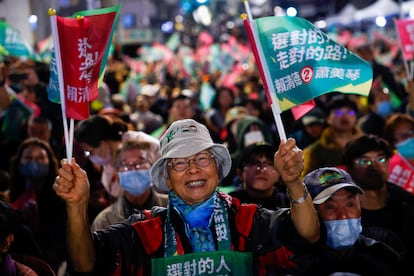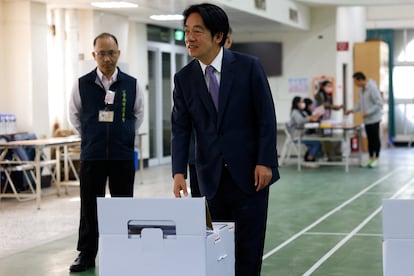Taiwan votes for continuity and elects candidate China considers ‘a danger’
The current vice president, Lai Ching-te, rejected by Beijing for his pro-independence stance, wins the presidential elections on the self-governed island

Taiwan has chosen to remain on the same path. The 19 million citizens summoned to the ballot boxes have opted to make the ruling party candidate and current vice-president, Lai Ching-te, president. The leader of the Democratic Progressive Party (DPP) led the race with 40.25% of the votes, according to official results with more than 96% of the polling stations counted. The nationalist party Kuomintang (KMT), inclined to a rapprochement with Beijing, came in second place with 33.39%, a greater margin than predicted in the polls.
The result sends a clear message to the other side of the Taiwan Strait, and to the world: the self-governed island that China claims as an inalienable part of its territory and which the United States supports militarily, will continue along the path started eight years ago by Tsai Ing-wen, the current president. Tsai will leave power after exceeding the legal limit of two terms that have been marked by the absence of communication with the People’s Republic, the growing tensions in the Strait and the rapprochement with Washington. He will be succeeded by Lai, 64 years old and a doctor by training, the option least favored in Beijing. The contest, much more than an election on this island where the superpowers clash, has marked the start of a crucial year of global elections, where almost half of the population is called to the voting booths — from India to the United States, passing through the European Union —.
The next president has defined himself during the election campaign as the best guarantor of “stability” and the maintenance of the current status quo in relations with the Asian giant. He has spoken of deepening the strategy of deterrence so that an armed conflict is unthinkable, but has committed himself to seek dialogue with Beijing, which will not be easy.
China, which considers the island a rebellious province which it intends to reunify peacefully, but without renouncing the use of force if necessary, has suggested instead that the DPP candidate hides a secessionist tendency, which “harms” the Taiwanese population and “endangers” peace in the Strait. The People’s Republic’s preferred option was the nationalist Kuomintang, a party traditionally inclined to a more friendly relationship with the Beijing government. The big question is what strategy the Asian giant will follow from now on.

The day before the elections, a spokesman for the People’s Liberation Army (PLA, the Chinese army) criticized Taiwan’s latest acquisition of U.S. weapons, and assured that such purchases only serve to bring the island closer to a “fierce war”. “The PLA is on high alert at all times and will take all necessary measures to resolutely crush any form of Taiwan’s secessionist plans for independence.”
This style of messaging is nothing new. They have been part of the campaign. And the island lives with them. The Government has denounced these days the interference of China by different means, from disinformation to military threats. But the day has passed with total normality in a young democracy, which takes the process very seriously. The polling stations opened at eight in the morning and closed at four in the afternoon, local time. Then began the counting of the votes with Taiwanese style, which is surprisingly transparent and efficient. It is publicly accessible and people come to the polling stations to watch it. Polling station members call out the votes loudly, holding up each ballot with two hands so that it is visible. They write down the results with ticks, the old-fashioned way. And finally they show the sheet with the results.

“I wanted to bring my daughter to see it,” says Shao Kai-yang, a 45-year-old architect, who dropped by Dongmen First School, a stone’s throw from the presidential palace in downtown Taipei. He wanted to show her that in different places there are different opinions and different results. But that they should be respected. He, who voted in another neighborhood, has opted for the winning DPP; at this polling station, however, the victory went to the nationalist Kuomintang, which will remain in opposition for a third term for the first time since 1996, when the island’s first democratic elections were held. Wang ji-shun, an 81-year-old resident who has been a member of the KMT “for 60 years,” was still hopeful of a victory after 5 p.m. He was confident of a change of government. He was confident of a change of government: “In terms of cross-Strait relations, the KMT is more secure”.
But as the count progressed, which went very fast in the island of semiconductors, the gap widened and PDP supporters came to the party headquarters to celebrate the victory.
Sign up for our weekly newsletter to get more English-language news coverage from EL PAÍS USA Edition
Tu suscripción se está usando en otro dispositivo
¿Quieres añadir otro usuario a tu suscripción?
Si continúas leyendo en este dispositivo, no se podrá leer en el otro.
FlechaTu suscripción se está usando en otro dispositivo y solo puedes acceder a EL PAÍS desde un dispositivo a la vez.
Si quieres compartir tu cuenta, cambia tu suscripción a la modalidad Premium, así podrás añadir otro usuario. Cada uno accederá con su propia cuenta de email, lo que os permitirá personalizar vuestra experiencia en EL PAÍS.
¿Tienes una suscripción de empresa? Accede aquí para contratar más cuentas.
En el caso de no saber quién está usando tu cuenta, te recomendamos cambiar tu contraseña aquí.
Si decides continuar compartiendo tu cuenta, este mensaje se mostrará en tu dispositivo y en el de la otra persona que está usando tu cuenta de forma indefinida, afectando a tu experiencia de lectura. Puedes consultar aquí los términos y condiciones de la suscripción digital.









































